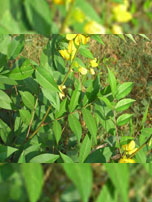Kasamardah

Botanical Name : Cassia occidentalis Linn
Family : Calsalpiniaceae.
Introduction :
Latin name : Cassia = the word is derived from the name kashan in Bible. The name is derived from the name of mountain cassia in North Seria.
Names in different Indian languages :
English : Coffee Senna, Foetid Cassia, Negro Coffee
Hindi : Kasaumdi, barikasaundi
Kannada : Doddaagace
Malayalam : Ponnaviram, ponnariviriram
Sanskrit : Kasamardah
Tamil : Paeyaavarai, Thagarai
Telugu : kasinda
Unani : Kasondi.
Folk : Kasondi (bigger var.)
Synonyms :
Kasamarda Rajavruksha, Kasaghna, Peetapushpaka, Deepana, Kanak, Jaranakala, Kartakasaghna, Anjan
Morphology :
A shrub 0.5 – 1 mts. high.
Leaves – compound and alternate. Each leaf has 5 pairs leaflets.
Flowers – yellow
Fruit – pod, Legumes – long, thin and round.
Each one has 10 – 30 seeds.
Distribution & Habitat :
All over India
Chemical constituents :
Anthraquinone,glucoside, barbaloin, aloin, formic acid, butyric acid, ceryl alcohol, kaempferol,bianthraquinone,glycoside, fistulin,rhein,sennosides A and B.
Properties :
Guna : ruksha, laghu, tikshna;
Rasa : tikta, madhur;
Veerya : ushna;
Karma :
Kasaghna, kandughna, deepana,pachana
Purgative, diuretic, febrifugal, expectorant, stomachic
Internal uses :
It is used in dermatoses and poisons. Useful as an analgesic in vata disorders. Being carminative and cholagogue, it is used in ascites, loss of appetite and constipation . Effective in cough and asthma.
Part used :
Leaf, seed, root
Dosage :
Leaf juice – 8 to 10 seeds – 1 to 2 gm; decoction of roots – 50 to 100 ml.
Therapeutic Uses :
Leaf juice + honey is used in whooping cough. Also useful in dysuria, ikshumeha, swelling, dermatoses and filarial.
Seed powder—used in amoebiasis.
Descriptions on Ayurveda books / Nighandu: